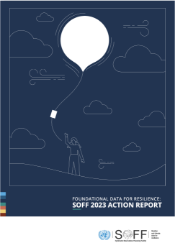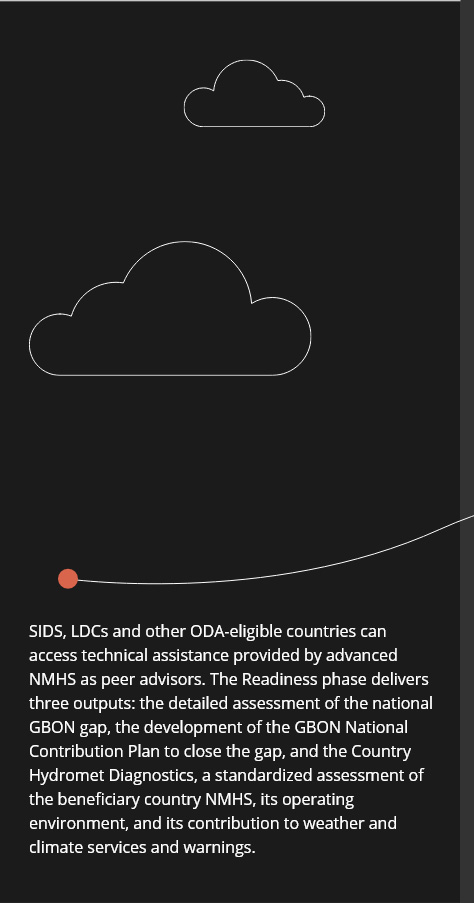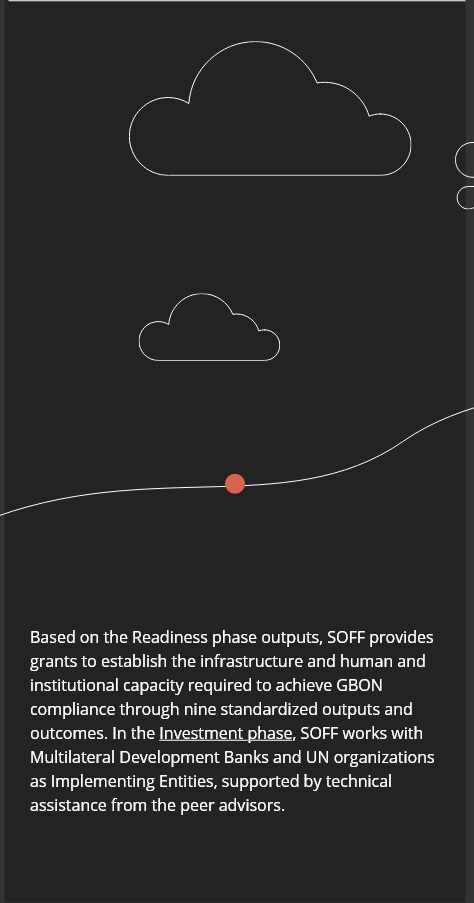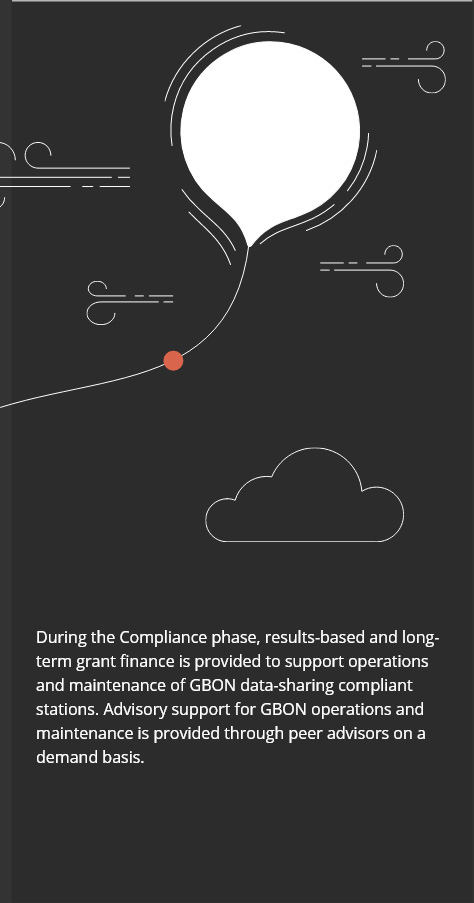SOFF Action Report 2023
Weather and Climate Data for Resilience
SOFF in Numbers
1.5 years of SOFF operation
The newly created Systematic Observations Financing Facility (SOFF) has rapidly become an important vehicle to improve the foundational data we use for weather forecasting and climate prediction. SOFF finances urgently needed investments in basic observation infrastructure and international data exchange and is providing a critical base for the UN Secretary-General’s Early Warnings for All initiative by 2027.
Achieving Global Observing Basic Network (GBON) compliance for global public good
Currently, Small Island Developing States (SIDS), Least Developed Countries (LDCs) and Lower Middle-Income Countries (LMICs), only meet 7% of the mandatory target of surface land GBON stations and 24% of upper air stations. Achieving compliance will provide local benefits and a global public good – weather and climate data.
Single purpose to provide long-term support
200km horizontal resolution for surface land stations to meet GBON standard density requirements will be enabled by SOFF
Clear Programming criteria for prioritizing beneficiary countries’ requests
3 Phases, 6 programming criteria: 62 countries are already programmed to receive SOFF support, and more will follow. SOFF support starts with the Readiness Phase. 6 countries already successfully moved into the second, the Investment Phase, in record time. The third phase, Compliance, provides long-term support to sustain countries’ data exchange compliant with GBON.
SOFF is delivering with ambition and speed
It takes 3.7 months on average for a country to be programmed until the Readiness funding is approved.
Leveraging partners’ competencies to maximize impact
72 international partners joining forces for maximum efficiency, to close the basic weather and climate observation gap together. This will lead to effective use of better data and forecast products.
CLOSING THE GAPS
101 countries have requested SOFF support to close the data gap, and USD 127 million are needed to close the current funding gap to deliver on the work program by 2025.

Foundational
Monitoring and prediction of weather and climate start from observations.
Closing today’s massive data gap in basic weather and climate observations is critical for effective investments in climate change adaptation and resilience.
Urgency of action
Increasingly unavoidable impacts of climate change necessitate urgent adaptation actions. Significantly stepping up the amount and the quality of investment on adaptation requires high quality weather forecasts and climate prediction to be available everywhere.
“Reporting from stations in remote areas of the globe contribute to global forecast quality up to 20 times more than any single station in continental Europe. This is why SOFF’s vision is so forward-looking and innovative“
Florence Rabier, Director-General, European Centre
for Medium-Range Weather Forecasts (ECMWF)
Data, the (in)visible ingredient
The challenge of missing data is at the root of every weather and climate forecast. In October 2021, the 193 Members of the World Meteorological Organization took a landmark decision on a new global standard for mandatory real time international data exchange of basic weather and climate observation.
Closing the observations data gap is essential for the world to understand and prepare for the impacts of a rapidly changing climate.
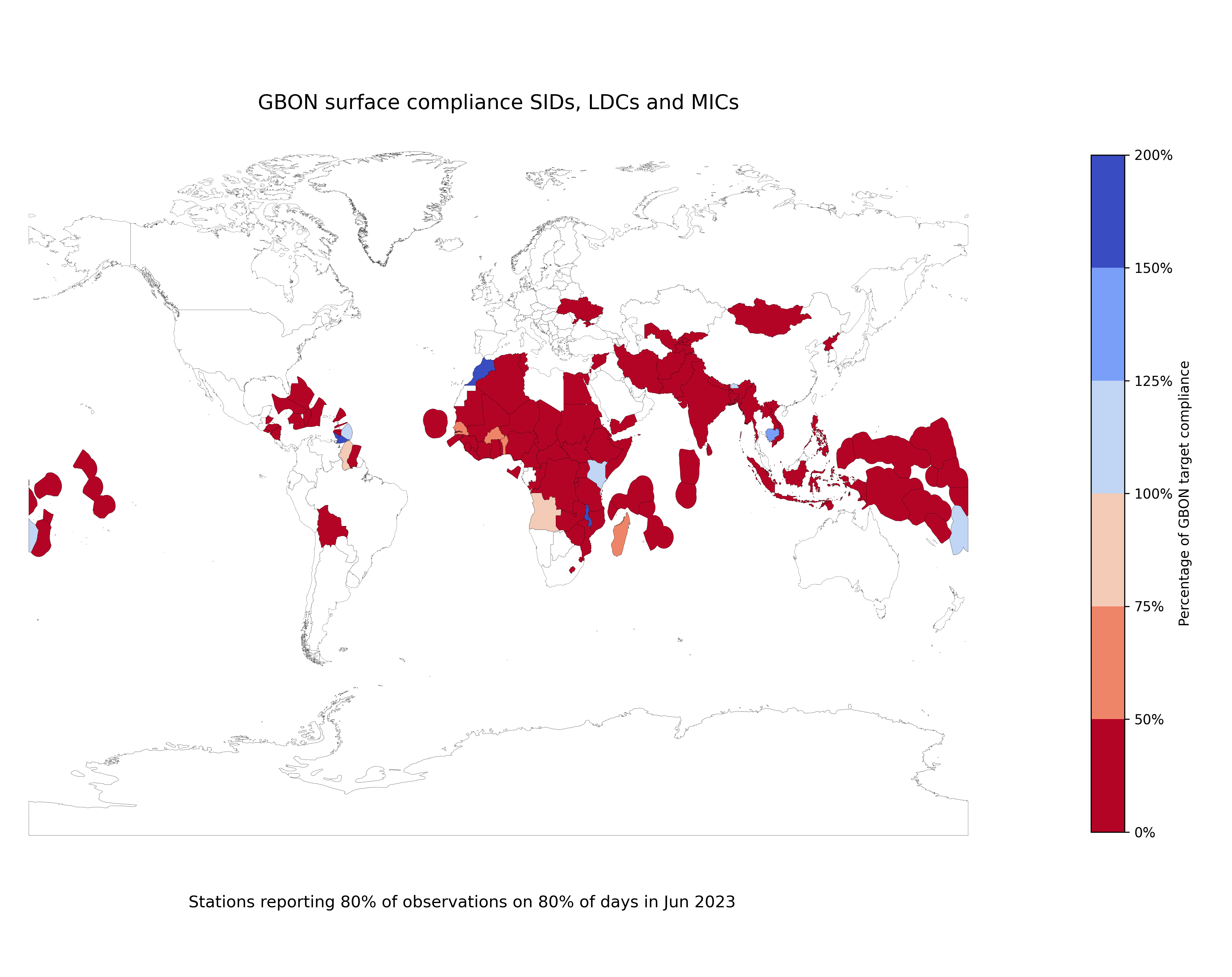
“The lack of observations from Small Island Developing States limits the quality of forecasts and climate data products globally, but especially in the countries from which observations are missing. AOSIS highly welcomes SOFF to support countries in closing the basic weather and climate observations gap“
Ambassador Luteru Pa’olelei, Permanent Representative of Samoa to the United
Nations and Chair of Alliance of Small Island States (AOSIS)
Closing the basic
data gap
According to the WMO GBON Global Gap Analysis of June 2023, the more than 100 countries classified as SIDS, LDCs and LMICs deliver only 7 % of the mandatory GBON surface land data and 24 percent of the GBON upper air data.
Every dollar invested in achieving GBON could help unleash additional economic benefits at a benefit-cost ratio of over 25:1.
Socio-economic
benefits

Unique
Focus on supporting countries to achieve GBON compliance
SOFF is a dedicated specialized United Nations Multi-Partner Trust Fund (UNMPTF) that provides long-term technical and financial support for countries to collect and internationally exchange basic weather and climate observations.
A specialized UN
Climate Fund
Single purpose: to provide long-term support to countries to close the GBON weather and climate data gaps and to share data internationally, therefore becoming GBON compliant. SOFF delivers on internationally agreed metrics through a standardized and output-based approach.
SOFF provides long-term, grant-only resources in recognition of the fact that GBON investments made in a particular country also create benefits for all other countries.
Open-ended grant
finance for
sustainability
Peer-to-peer
technical
assistance
Peer-to Peer-advisors provide experience, consistency and stability in technical assistance. SOFF enhances beneficiary countries’ capacity by harnessing the operational experience of advanced National Meteorological and Hydrological Services
“One of the unique design features of SOFF is its innovative, hands-on, peer-to-peer technical assistance, including South-South support. The South African Weather Service is proud to serve as a SOFF peer advisor.“
Ishaam Abader, CEO of South African Weather Service and Permanent Representative of
South Africa with WMO
The importance of Systematic Observation to better understand climate change has been referenced by the United Nations Framework Convention on Climate Change (UNFCCC), the Paris Agreement, and COP27 decisions.
UNFCCC urges support
for Systematic
Observation
WMO TECHNICAL
AUTHORITY
Being responsible for providing basic technical support to SOFF peer advisors, implementing entities and beneficiary countries, WMO also screens SOFF outputs. 50+ GBON National Gap Analysis, GBON National Contribution Plan and Country Hydromet Diagnostics have already been screened.

Sequenced
Three Phases of SOFF support
A sequenced support to countries to close their GBON gaps.
Outcome
SOFF’s overall goal is to strengthen climate adaptation and resilient development through improved weather forecasts, early warning systems and climate information services through sustained GBON compliance. SOFF provides its grant finance and technical assistance in three programmatic phases: Readiness, Investment and Compliance. Each stage has clearly defined outputs outlined in the SOFF Theory of Change.
SOFF defines its programming based on clear technical and operational criteria.
The SOFF programming criteria include closing significant data gaps in areas with poor observational coverage, targeting easy fixes, maximizing delivery capacity, creating leverage through complementary initiatives, focusing on subregional gains for efficiency, and ensuring balanced support across regions and country types, prioritizing SIDS and LDCs, including Fragile and Conflict-affected States.

Fast-paced
SOFF is delivering with ambition and speed.
SOFF has gone above and beyond what was initially envisaged for the first 18 months of SOFF operation.
READINESS PHASE
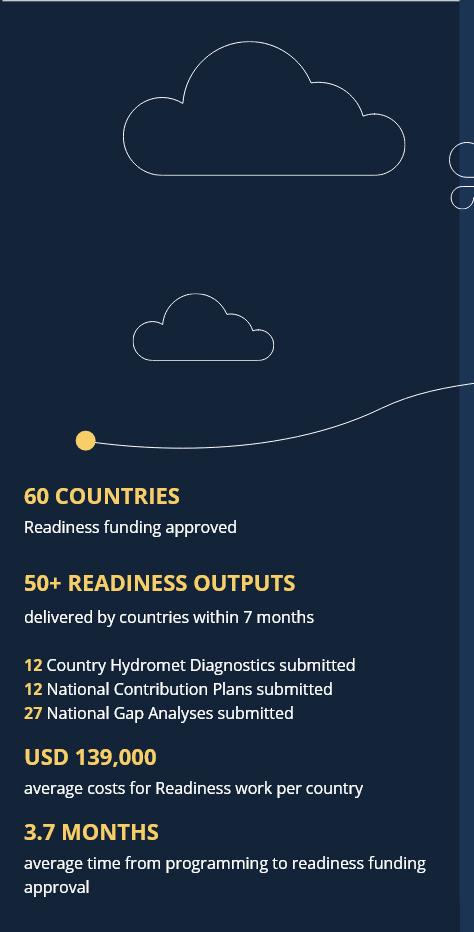
INVESTMENT PHASE
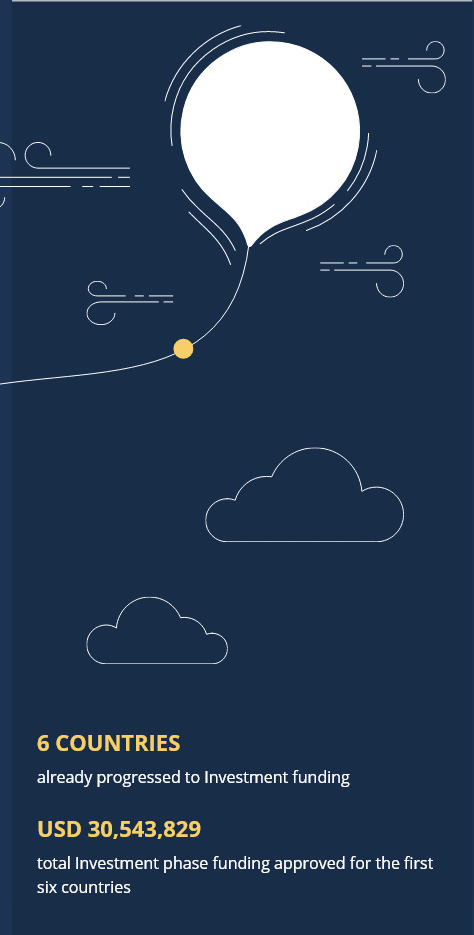
Going above and beyond
Given the high levels of country demand for SOFF support and the urgency of aligning SOFF programming with the UN Early Warnings for All initiative, SOFF has gone above and beyond what was initially envisaged for the first 18 months of SOFF operation. As of November 2023, SOFF has programmed support to 62 countries, and approved Readiness funding for 60 countries and Investment funding to six countries.
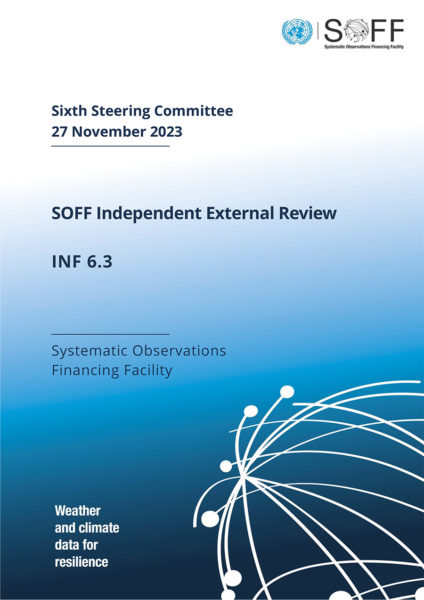
EXTERNAL REVIEW
An independent review was commissioned to assess SOFF design and early implementation and found that SOFF has had a very successful trajectory to date and has been delivering on its commitments in all areas that it covers.
Download nowSOFF PORTFOLIO
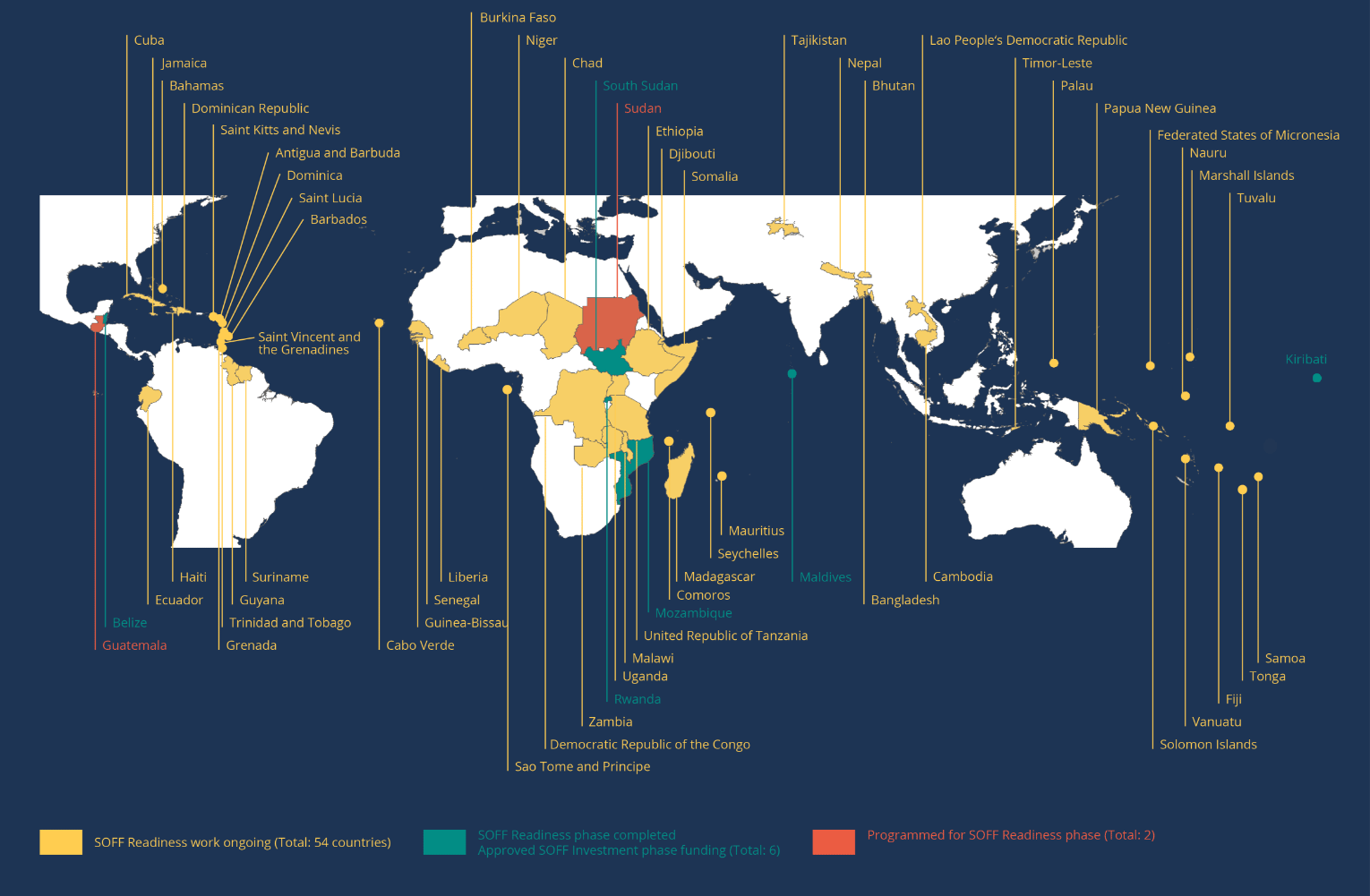
SOFF utilizes a Risk Management Framework to assess and mitigate potential risks that might affect its implementation. A preliminary Fund-level assessment showed that SOFF is a high-risk Fund, mostly due to the institutional and programmatic risks associated with the implementation in countries with challenging socio-economic contexts, such as Fragile Conflict-afflicted States. One third of the countries in the SOFF active portfolio are classified as such. Another important Fund-level risk is the uncertainty of reaching the funding target in a timely manner.
Managing risks
“Bhutan highly welcomes SOFF support and is concluding its Readiness phase. Closing the basic weather and climate data gap in Bhutan and other vulnerable countries will improve global weather models substantially, leading to better local forecasts and more effective early warnings.“
Karma Dupchu, Director National Centre of Hydrology and Meteorology, Royal Government
of Bhutan and Permanent Representative of Bhutan with WMO
Soff gender considerations
SOFF promotes gender equality and strives to ensure that gender considerations are systematically integrated in all SOFF activities. The targets are laid out in the SOFF Gender Action Plan.
MOZAMBIQUE

Mozambique

South African Weather Service

World Food Programme
Mozambique has already completed the SOFF Readiness phase with support from the South African Weather Service as peer advisor. With currently no GBON-compliant stations, Mozambique is receiving USD 7.8 million in Investment phase support to install six new land surface stations, upgrade 15 existing surface stations and install four upper-air stations to meet GBON requirements. The World Food Programme is supporting Mozambique as its SOFF Implementing Entity and ensures data better data and forecast products serve the most vulnerable.
KIRIBATI

Kiribati

Bureau of Meteorology, Australia

UNEP
Kiribati is a Small Island Developing State with an exclusive economic zone covering 3.5 million square kilometers – larger than the size of India – and hence to achieve GBON compliance has a huge observation remit. With currently no GBON-compliant stations in the country, Kiribati is receiving SOFF Investment funding of USD 10.8 million to upgrade 14 existing land surface stations, upgrade one existing upper air station, and install two new upper air stations to achieve GBON compliance. The country is supported by the Australian Bureau of Meteorology as peer advisor and UNEP as SOFF Implementing Entity.

Integrated
Leveraging partners’ competencies
The SOFF Secretariat facilitates coordination, coherence and integration between beneficiary countries, the SOFF governing bodies (Steering Committee and Advisory Board), the SOFF operational partners (Implementing Entities, peer advisors, WMO Technical Authority), and the UNMPTF Office as trustee.
Implementing Entities
SOFF supports and leverages the investments of its Implementing Entities, which include Multilateral Development Banks and UN organizations.
Multilateral
Climate Funds
SOFF closely partners with the multilateral climate funds represented in its governance structure and fosters coherence of investments throughout the meteorological value chain. A Collaboration Agreement jointly developed with the Secretariats of the Adaptation Fund Board, Climate Investment Funds, Climate Risk and Early Warning Systems initiative, Global Environment Facility, and Green Climate Fund, aims to improve systematic observation and effective use of weather and climate data for climate action.
Maldives

Maldives

Finland

UNEP
Maldives, with support from the Finnish Meteorological Institute and Indonesia Meteorology, Climatology, and Geophysical Agency as SOFF Peer Advisors and UNEP as SOFF Implementing Entity, completed the SOFF Readiness Phase. Currently lacking GBON-compliant stations, Maldives is receiving USD 4.8 million for the Investment phase to upgrade four existing surface stations, install one new surface station and upgrade an obsolete upper air station.
South Sudan

South Sudan

Geosphere Austria

African Development Bank
South Sudan, supported by Geosphere Austria and the African Development Bank , completed the Readiness Phase. The South Sudan Meteorological Services is challenged with observation, IT, and human resource limitations. For the first stage of phased SOFF investment support, the country is receiving USD 2.5 million that will enable the installation of five manual stations and four Automatic Weather Stations as well as the rehabilitation of one.
Everybody under one Roof
72 international partners are joining forces to close the basic weather and climate observation gap and make effective use of better data and forecast products.
|
Steering Commitee Members and Funders
|
Advisory board
|
Operational partners
|
|||||||||||||||||||||||||||||||||||||||||||||||||||||||||||||||||||||||||||||||||||||||||||||||||||||||||||||||||||||||||||||||||||||||||||||||||||||||||||||||||||||||||||||||||

In Demand
CLOSING THE GAPS
To close the basic weather and climate data gap, the funding gap must be closed.
Closing the basic weather and climate data gap
While SOFF has substantially raised its ambition and has already programmed Readiness support to 62 countries. In total, 101 countries have requested SOFF support, either individually or as part of regional initiatives. Many countries’ requests for SOFF support have not yet been considered.
“One critical aspect of SOFF is that it substantially concretely contributes to cover operations and maintenance costs, which is a crucial element for sustainability – in the long term and through results-based finance, establishing a new relationship among equal partners, beneficiary countries and SOFF funders.“
Madeleine Diouf Sarr, Least Developed Countries Group on Climate Change Chair
Closing the funding Gap
12 initial funders have mobilized USD 73 million in pledges so far. The updated SOFF work program is targeting Readiness support for in total 75 countries and Investment support for 50 countries by June 2025. To deliver on this program, SOFF needs to close the current funding gap in the amount of USD 123 million to reach the 200 million short-term funding target.
“The world is in a race against time to protect those on the frontlines of the climate crisis. Early Warning systems are an easily available, effective and proven lifesaving tool to protect the lives. All stakeholders must to mobilized to support the achievement of the Secretary-General’s goal of ensuring universal access to early warning systems by 2027. We need all hands on deck to make this happen. One life lost from a lack of access to an effective early warning system is one life too many.“
Selwin Hart
SOFF is a delivery vehicle of the UN Early Warnings for All initiative
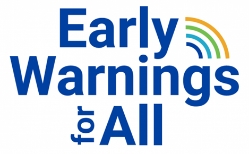
SOFF is a foundational element and delivery vehicle of the initiative by the UN-Secretary General, to ensure that every person on the planet is covered by early warnings by 2027. All 30 initial focus countries of the initiative are already included to receive SOFF support, and four of these countries are among the SOFF frontrunner countries that are already receiving SOFF Investment phase support: Kiribati, Maldives, Mozambique and South Sudan. South Sudan is also a focus country of the Water at the Heart of Climate Action initiative supported by the Kingdom of the Netherlands.
HISTORY OF SOFF
Journey since 2019
- 2019
-
World
Meteorological
Congress establishes
GBON concept 193 Member States and Territories of the World Meteorological Organization agreed to set global requirements for continuous real time international data exchange of basic weather and climate observation to improve forecast products.JUNE 2019
-
Alliance for
Hydromet
Development
launched At COP25, 12 international development, humanitarian and climate finance institutions collectively committed to scale up and unite efforts to close the hydromet capacity gap by 2030, with SOFF creation as a priority.DECEMBER 2019
- 2020-2021
-
First to Fifth
Funders Forum A series of events presented to potential funders the main advances for the establishment of SOFF, including expanding the value proposition and institutional and governance arrangements.March 2021-April 2022
-
World Meteorological
Congress endorses
SOFF Congress took landmark decisions by approving the new WMO Data Policy to enhance the free and unrestricted exchange of Earth System Data, passed the new GBON standard as the backbone for weather, climate and hydrological services, and endorsed SOFF as the new financing mechanism to support countries' GBON compliance.NOVEMBER 2021
-
At COP26, WMO, UNDP
and UNEP establish
SOFF as a UN Fund WMO, UNDP and UNEP signedthe Memorandum of Understanding to legally establish SOFF as UN Multi-Partner Trust Fund.March 2021-April 2022
-
Launch of SOFF Start-
up phase and
establishment of SOFF
Secretariat The Start-up phase was launched to establish the SOFF Secretariat administratively hosted by WMO, to fine-tune proposed governance arrangements, to prepare the First-year operational programme and budget and to prepare the first SOFF Steering Committee meeting.JANUARY 2021
- 2022
-
First pledge to
SOFF The Nordic Development Fund pledged as first funder EUR 10 million to SOFF.MARCH 2022
-
1st SOFF Steering
Committee meeting in
Helsinki opens SOFF
doors for business The first SOFF Steering Committee meeting comprised of seven initial funders (Austria, Denmark, Finland, Iceland, Ireland, NDF, Norway) and stakeholder group representatives adopted the SOFF governance structure, the SOFF programming criteria, and the initial SOFF work programme.JUNE 2022
-
2nd and 3rd Steering Committee
meeting Decisions of the second SOFF Steering Committee meeting included the adoption of SOFF Operational manual and the endorsement of SOFF Resource Mobilization and Outreach Strategy.
The third meeting decided on the inclusion of the first 26 countries with a request to prepare Readiness funding requests, and adopted the SOFF Readiness phase Results Framework and the SOFF Gender Action Plan.
Total countries programmed: 26OCTOBER - NOVEMBER 2022
-
COP27 emphasizes need to address existing gaps in the global climate observing system and SBSTA appreciates SOFF progress At COP27 the UN Early Warnings for All Executive (EW4All) Action Plan was launched, including SOFF as a delivery vehicle. The COP27 cover decision emphasized the need to address existing gaps in the global climate observing system and welcomed EW4All. SBSTA noted with appreciation the progress on systematic observation through SOFF.
NOVEMBER 2022
- 2022
-
4TH Steering Committee meeting programs additional countries and approves first Readiness funding requests from 26 countries The fourth SOFF Steering Committee meeting approved the Readiness Phase Funding Requests from 26 countries, programmed additional 14 countries, and adopted the SOFF Risk Management Framework. Spain and US joined as Funders and Steering Committee members.
Total countries programmed: 40 (+14)
Total readiness phase funding requests approved: 26MARCH 2023
-
5TH Steering Committee meeting in Copenhagen increases SOFF ambition The fifth meeting decided to expand SOFF support to 62 countries, including all EW4All focus countries, approved 10 additional Readiness funding requests, and requested the SOFF Secretariat to analyse implications of a Middle-Income-Country expansion. Netherlands and Belgium joined as Funders and Steering Committee members.
Total countries programmed: 62 (+22)
Total readiness phase funding requests approved: 36 (+10)JUNE 2023
-
1st intercessional Steering Committee decision approves additional Readiness Phase Funding Request The Steering Committee approved additional Readiness Phase Funding Requests from 23 countries and one addendum to a prior funding request in the first intersessional
Total countries programmed: 62
Total readiness phase funding requests approved: 59 (+23)September 2023
-
6TH Steering Committee meeting approves first six Investment phase funding requests and decides on phased and prioritized SOFF expansion The Steering Committee approved the Investment Funding Requests from 6 SOFF frontrunner countries that already completed the Readiness phase. It further took important decisions by adopting a phased and prioritized expansion of SOFF financial support to lower Middle-Income Countries and adopting the Collaboration Framework between SOFF and the Adaptation Fund, Climate Investment Funds, CREWS initiative, Global Environment Facility and Green Climate Fund. Canada joined as Funder and Steering Committee member.
Total countries programmed: 62
Total readiness phase funding requests approved: 60 (+1)
Total investment phase funding requests approved: 6November 2023
-
COP28 SOFF organizing and being represented at several high-level events.
Engagement with parties to strengthen support for systematic observation.December 2023
- Future
